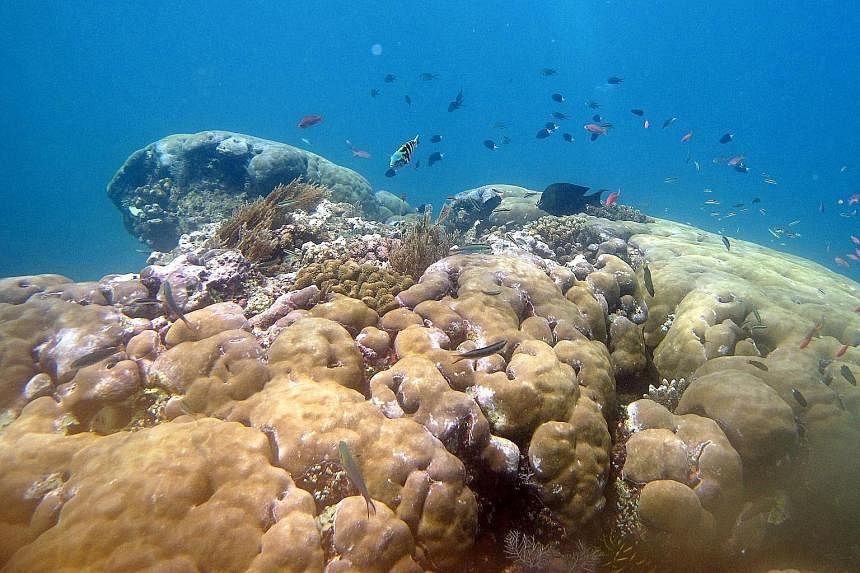MIAMI • Global warming doesn't just pose a serious threat to marine ecosystems, it could also affect the livelihood of millions of people, new studies show.
Uncontrolled climate change will damage the coral reefs that provide a habitat to a quarter of the species in the oceans as the water grows warmer and more acidic. That could result in fewer fish being caught. What's more, the seafood that make it to our dinner plates are likely to be smaller too.
With less to see in the oceans, global tourism would take a US$10 billion (S$13.5 billion) hit annually, with the United States and Australia badly affected, unless steps are taken to restrict emissions, a study says.
Building on the consensus science published by the Intergovernmental Panel on Climate Change last year, the paper by the journal Science considered the impact of climate change on the world's oceans in a business-as-usual fossil fuel consumption scenario (RCP8.5) and one where steps were taken to curb burning of fossil fuels (RCP2.6), reported The Guardian.
In the years to 2100, RCP8.5 would involve six times higher carbon pollution globally than RCP2.6, the study says. This would result in oceans that were 30cm higher, with nearly 2 per cent lower oxygen content, 70 per cent higher acidity and sea surface temperatures about 2 deg C hotter than if ameliorative steps were taken.
Many marine species are already shifting to different geographic regions as the oceans warm and this poses challenges for the fishermen dependent on the oceans for their livelihood, the study says.
"Recent studies strongly reiterate that many species - including various invertebrates, commercially important fish species and marine mammals - are undergoing phenological and geographical shifts of up to 400km per decade as a result of warming," the researchers wrote. The shifts would occur about 65 per cent faster in the business- as-usual scenario than under RCP2.6.
The study also estimated the economic impact of rising ocean levels and the loss of coral reefs that protect coastlines due to climate change. These phenomena would expose 0.2 to 4.6 per cent of the global population to inundation at a cost of 0.3 per cent to 9.3 per cent of global GDP, the study said.
While the loss of tourism due to depleted coral reefs under the RCP2.6 scenario would be around US$1.9 billion, the study estimates, it would be US$12 billion per year in RCP8.5. On Australia's Great Barrier Reef alone, the loss could be as much as US$5.7 billion, putting 69,000 jobs at risk. And ocean acidification could cause an annual loss of reef ecosystem services that are valued at up to US$1 trillion by 2100, the study warned.
Another study in Nature Climate Change this week focused on rearing pink salmon embryos and juveniles for 10 weeks in two separate tanks - one that matched current CO2 levels in the water and the other with elevated levels predicted in the future, reported CBS News.
It found that the fish exposed to higher levels of CO2 were significantly smaller, putting them at higher risk of predation.
A study by the National Oceanic and Atmospheric Administration, the University of Alaska and a shellfish hatchery concluded that worsening ocean acidification would not permit Alaskan coastal waters to support shellfish hatcheries by 2040 unless the sea water used was modified, highlighting another threat of climate change.

